5 Reasons Why Fallout: New Vegas is Better than Fallout 3
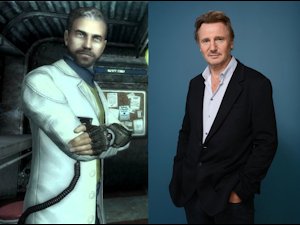 | | Best video game father of all time |
While all reports indicate it will be sorely lacking in Liam Neeson, Fallout 4 is by far one of the most anticipated video games coming out this holiday season. Personally, I'm so hyped my head may explode, though that will make playing the game mighty difficult when it does come out. In preparation for the wonderous day of its arrival, I've been replaying earlier games in the series, including Fallout 3 and Fallout: New Vegas (I even got a copy of the original Fallout through Steam in a fit of nostalgia). One thing I have long grappled with is the relative unpopularity of New Vegas, a game that many fans on the Internet seem to believe is a poor imitation of Fallout 3. Heck, it isn't even a properly numbered game in the series, so how good can it be?
I'm here to set the record straight once and for all: Fallout: New Vegas is not only a game that deserves to be in the same category as the other numbered games in the series, it is without a doubt the greatest Fallout game released to date (for the next two months, I'm assuming). Yes, it is slightly more glitchy; yes, it wasn't made by the same team; yes, it pretty much just steals the game engine and design; and yes, there's no Neeson; but New Vegas is nevertheless superior to Fallout 3 in every other way. Here are just five examples how.
It Was Made by Some of the Original Team Members
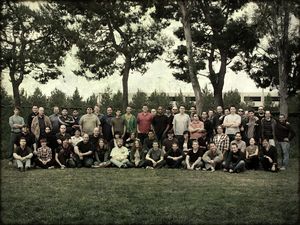 | | And apparently they did it without a building to work in |
Developed by Obsidian Entertainment rather than Bethesda Softworks, New Vegas is often written off as the lesser of the two because the Bethesda name carries so much weight in this day and age while Obsidian usually earns a "who?" from game nerds like myself. That said, the team at Obsidian behind New Vegas consists of many of the original Black Isle Studios team members responsible for the first two games in the series. As such, they didn't have to try to be faithful to the source material--they made the source material--and they were able to do things Bethesda was unwilling to do with Fallout 3.
For this reason, the story of Fallout: New Vegas feels more like a direct sequel to Fallout 2 than Fallout 3 does. It follows up on characters, settings, and scenarios set up in the first two games, and it builds on the momentum of those stories in a way that Fallout 3 just can't, since it's so far removed from them, geographically and narratively. Additionally, while changes to the Fallout 3 gameplay mechanics were minor tweaks at best, they were tweaks that pushed the series back to its roots, with more emphasis on tribal affiliations and survival.
The Main Storyline is More Diverse and Ambiguous
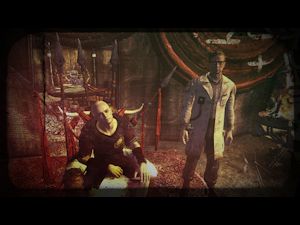 | | I don't even know how this is possible |
I'm not going to argue that the main storyline of Fallout 3 is bad. After all, it has a giant robot as a central plot point. However, it is relatively short and really only branches into two or three directions, one of which is an obviously "good" ending. The main story of Fallout: New Vegas, however, is significantly longer, has more branch points, and throws in plenty of moral ambiguity about where the player should take it.
You can choose to side with one of many different groups in the ultimate battle for Hoover Dam, but no one group has a monopoly on moral righteousness. Sure, Caesar's Legion, with its emphasis on violence and slavery, is the obvious "bad" choice, but there is no obvious "good" side, as the NCR can be a bit tyrannical, Mr. House is kind of insane and ruthless, and the Brotherhood of Steel is on its last legs because of its own ideological inflexibility. You can choose to fight against all sides for true independence, but even that ending has bitter notes that hint at the inevitability of your own tyrannical dictatorship. The biggest choice you get to make in Fallout 3 is whether to purify the Capital Wasteland's water supply or whether to infect it with a horrible mutagenic virus designed by the Enclave. Not really a tough call, that.
The Mojave Wasteland is More Engaging
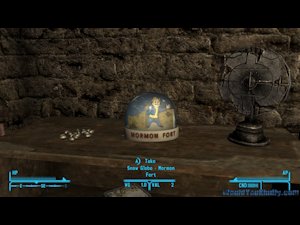 | | Granted, bobbleheads are far superior to snowglobes |
Not only is the main storyline longer, but the game itself contains far more stuff to do. While the main game maps are roughly identical in sheer real estate size, there are more side missions (54 named missions to just 17), bigger DLC worlds, more diverse buildings and cave systems, a wider variety of animals and enemy types, and more discrete locations in New Vegas. Dedicated completionists can do pretty much all there is to do in Fallout 3 in under 100 hours, but I've got a save on New Vegas that is approaching 200 hours and I still haven't done everything.
To be fair, this is not a slight against Fallout 3. Any game that pushes the 100 hour mark without getting old is awesome, and if the missions and locations in New Vegas weren't as interesting, it would still be the lesser of the two games. However, if anything, the locations in New Vegas are more interesting and diverse. Sure, the Capital Wasteland has more real world landmarks whereas the Mojave Wasteland has a meager approximation of the Vegas strip, but New Vegas puts more time and energy into its various landscapes and areas, even the ones many players will never see.
The Characters Have More Dimension
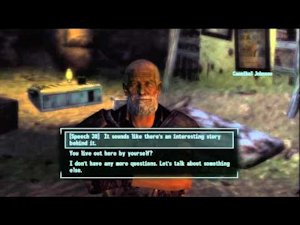 | | You're a nice old man and all, but uh, why do they call you Cannibal? |
Fallout 3 has many memorable characters, including the unflappable Moira Brown and the batshit Allistair Tenpenny, but they are all pretty easy to judge on first impressions. However, the characters in Fallout: New Vegas, while just as memorable, are more nuanced and sympathetic. There are few straight-up evil villains (aside from Caesar and his Legates, of course), and there aren't any real saints either. Even the most apparently unimpeachable characters, such as NCR Chief Hanlon or the people behind series mainstay the Crimson Caravan, harbor dark secrets and motives that are both questionable and relatable, whereas some of the seemingly malevolent figures, like the caustic Nightkin Keene or the fanatical Ghoul leader Jason Bright, are driven by understandable or even forgivable motives. The writers took great care to make it difficult to judge the people of the Mojave, often turning expectations on their head to serve a more compelling narrative.
There's also more effort put into how NPCs relate to each other. As New Vegas sets a high priority on factions and the various groups that inevitably band together and battle for control in the post-apocalypse, it gets quite complicated to track the various relationships between them. Some groups, such as the Followers of the Apocalypse, are downright enigmatic, especially as they butt heads with the usually tolerant NCR. What makes things even more interesting is that not all members of a group will feel the same way, and you might find people in Caesar's Legion who are losing faith in the oppressive regime or people in the Brotherhood of Steel who long to make peace with the NCR. Much of the narrative is driven by these competing interests, and sometimes the player is merely a catalyst who sets these characters in motion and then sits back to see how they react to one another. There's really nothing like that anywhere in Fallout 3.
There is More Customization and Deeper RPG Mechanics
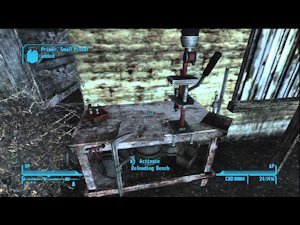 | | The Capital Wasteland doesn't have reloading benches with which to improve your ammo |
At first blush, there aren't many differences in gameplay between these two games. However, after a deep dive, it becomes clear that New Vegas goes much further in granting players freedom to customize their characters to their style of gameplay. Don't get me wrong; this series is a standard-bearer for these kinds of RPG mechanics, and the developers at Bethesda have proven time and again that they are pioneers in giving players ultimate freedom to play however they please.
Fallout 3 is incredibly deep, but New Vegas goes even deeper. There are more things to craft, more types of armor and weaponry to play with, multiple types of currency, more factions to join or make enemies with, more ammo types, weapon mods, and cybernetic implants to improve or change your basic stats. In short, New Vegas makes Fallout 3 (which I reiterate is one of the best examples of RPG freedom and customization) seem as linear and simplistic as Super Mario Bros., and it does it without getting overwhelmingly complicated or exploitably unbalanced. If all the promises of Fallout 4 pan out as advertized, it will no doubt be even better, but for now, New Vegas is the freest, deepest, and most balanced RPG of the series, hands down.
I feel the need, in conclusion, to defend Fallout 3, even as I have just spent several paragraphs tearing it down. The existence of New Vegas doesn't take away the greatness that is Fallout 3, a game that reinvigorated a dead franchise by bringing into the 21st Century without losing any of its essential ingredients. Bethesda is one of the greatest developers out there, and without it, there wouldn't be anything beyond Fallout 2 except for the remnants of the long-cancelled Fallout: Van Buren (most of which actually made their way into New Vegas). Arguing New Vegas is better than Fallout 3 is like saying $10 billion is better than $9.5 billion. At the end of the day, both are wonderful things I am happy to have in my living room.
-e. magill 9/16/2015
|
|